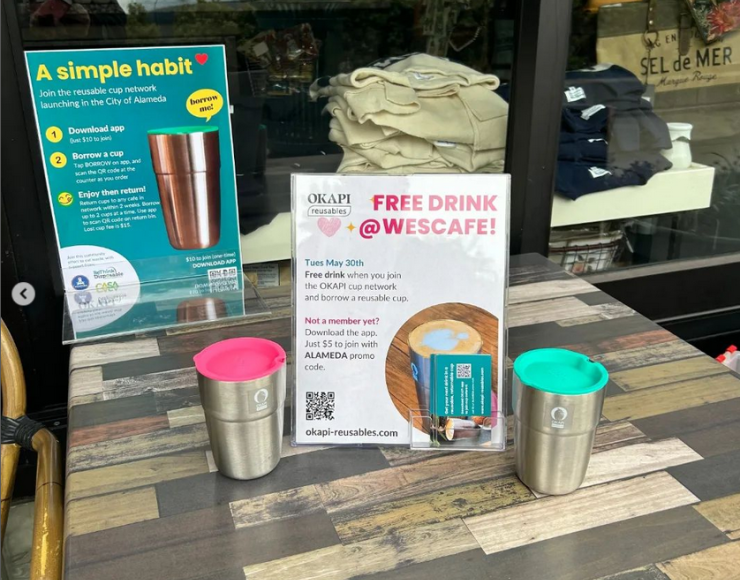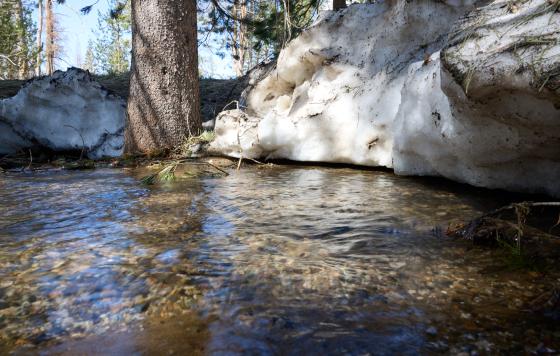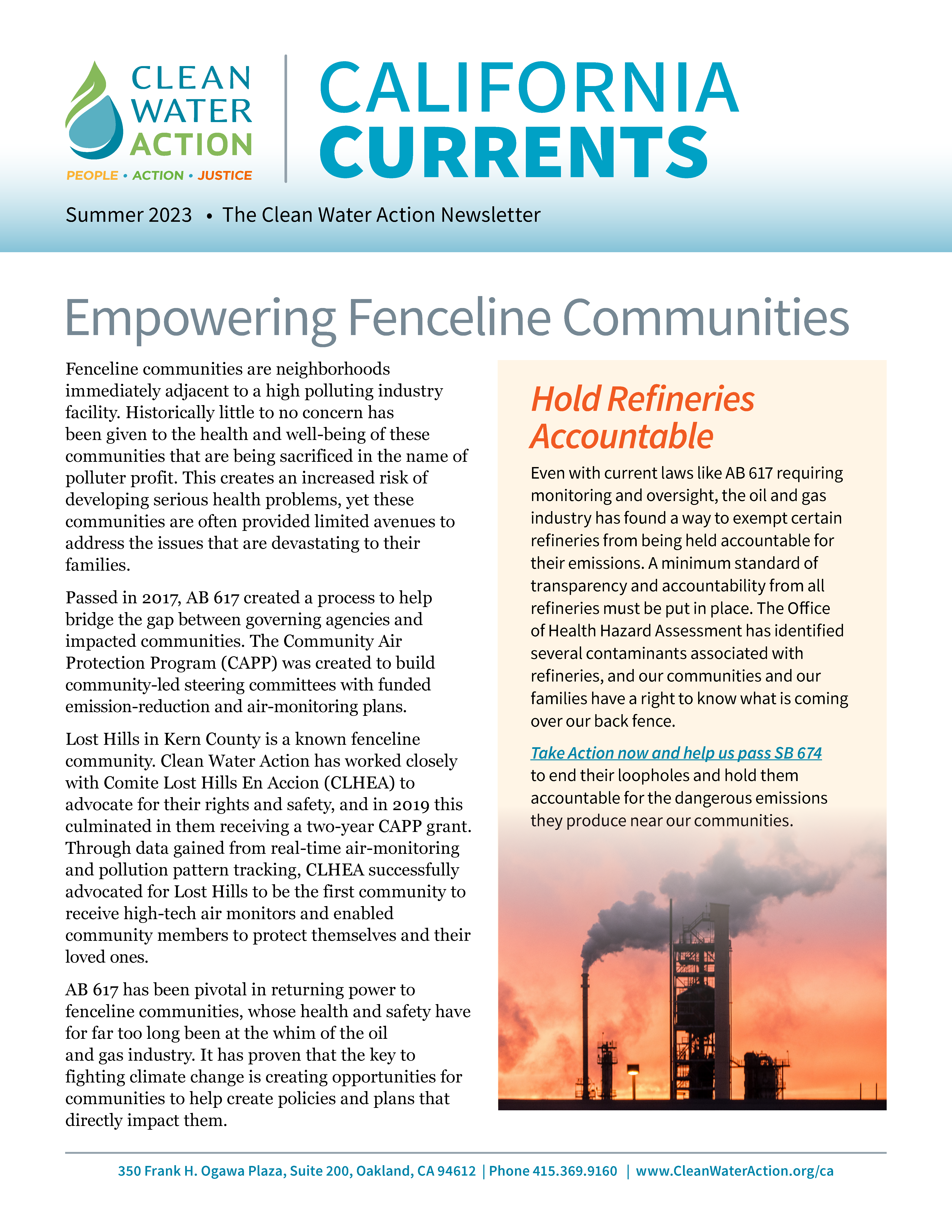In This Issue:
- Empowering Fenceline Communities
- Hold Refineries Accountable
- More Progress on PFAS!
- Groundwater Recharge Must Consider Drinking Water Quality
- ReThink Keeps On Growing!
- Download a PDF of this issue
Empowering Fenceline Communities
Fenceline communities are neighborhoods immediately adjacent to a high polluting industry facility. Historically little to no concern has been given to the health and well-being of these communities that are being sacrificed in the name of polluter profit. This creates an increased risk of developing serious health problems, yet these communities are often provided limited avenues to address the issues that are devastating their families.
Passed in 2017, AB 617 created a process to help bridge the gap between governing agencies and impacted communities. The Community Air Protection Program (CAPP) was created to build community-led steering committees with funded emission-reduction and air-monitoring plans.
Lost Hills in Kern County is a known fenceline community. Clean Water Action has worked closely with Comite Lost Hills En Accion (CLHEA) to advocate for their rights and safety, and in 2019 this culminated in them receiving a two-year CAPP grant. Through data gained from real-time air-monitoring and pollution pattern tracking, CLHEA successfully advocated for Lost Hills to be the first community to receive high-tech air monitors and enabled community members to protect themselves and their loved ones.
AB 617 has been pivotal in returning power to fenceline communities, whose health and safety have for far too long been at the whim of the oil and gas industry. It has proven that the key to fighting climate change is creating opportunities for communities to help create policies and plans that directly impact them.
Hold Refineries Accountable
Even with current laws like AB 617 requiring monitoring and oversight, the oil and gas industry has found a way to exempt certain refineries from being held accountable for their emissions. A minimum standard of transparency and accountability from all refineries must be put in place. The Office of Health Hazard Assessment has identified several contaminants associated with refineries, and our communities and our families have a right to know what is coming over our back fence. Take Action now and help us pass SB 674 to end their loopholes and hold them accountable for the dangerous emissions they produce near our communities.
More Progress on PFAS!
PFAS are not only “forever” chemicals that don’t break down in the environment and remain in our water and air, they’re also “everywhere” in products ranging from personal care items to artificial turf in playing fields. Virtually all of us have PFAS in our bodies. The good news is that California continues to make progress in eradicating toxic PFAS from various products.
In addition to previous bills banning PFAS in food packaging, children’s products, textiles, and firefighting foam, three new bills have already passed the state Assembly this year and are moving to the Senate. Clean Water Action supports all three as another important step in protecting our health and our water resources.
AB 246, authored by freshman Assemblymember Diane Papan (San Mateo), will phase out PFAS in menstrual products by 2027. The concern is that PFAS can be absorbed through the skin in highly sensitive areas of the body, expanding the threat of cancers, reproductive problems and other issues.
AB 727 by Assemblymember Akilah Weber (San Diego) will phase out PFAS in both household and commercial cleaning products starting in 2025. PFAS are common in various cleaners, particularly polishes. While this is a threat to all Californians when such products are used in their homes or workplaces, janitorial staff are especially vulnerable to high levels of exposure.
AB 1423, introduced by freshman Assemblymember Pilar Schiavo (San Fernando Valley), restricts PFAS in artificial turf. PFAS has been found in all of the grass-like coverings that were tested, either because they are a product ingredient or part of the production process. By 2024 this bill would require manufacturers or installers to tell customers when PFAS is present in artificial turf and prohibit any new PFAS containing turf to be installed at most educational facilities to protect young athletes. It will ban the further sale of PFAS-containing surfaces in the state by 2025.
You can help get these bills passed by letting your state Senator know that they should support eradicating PFAS. To find out who your Senator is and how to contact them, go to: https://findyourrep.legislature.ca.gov. Feel free to leave a message either during the day or after hours.
Tell them that you, as their constituent, call on them to protect our environment and public health by stopping the use of PFAS. Tell them that you want them to vote “aye” on AB 246, AB 727, and AB 1423 when these bills come before them during the legislative process.
⬆️ PFAS has been found in artificial turf. AB 1423 would protect young athletes by prohibiting the installation of PFAS-containing turf at educational facilities.
Groundwater Recharge Must Consider Drinking Water Quality
In California, overapplication of fertilizer is common and can result in high levels of nitrates leaching into groundwater from the soil. Communities in rural agricultural regions depend on shallow domestic wells and small water systems that are highly susceptible to contamination from nitrate. Nitrate levels in drinking water above 10 mg/L can cause methemoglobinemia (blue baby syndrome) and an increased risk of cancer, among other health impacts.
In 2012, California passed the Human Right to Water Act, declaring that every human being has a right to safe, clean, affordable and accessible drinking water. Clean Water Action works to implement that right by promoting safe drinking water to communities impacted by nitrate contamination and creating requirements for agriculture to reduce its nitrate use to sustainable levels.
There’s a major concern that this year’s floodwaters will flush nitrates that have built up in the soil into community drinking water sources. California has seen a rapid shift from drought to flood this past winter. According to the Department of Water Resources (DWR), this will go down as one of the largest snowpack years on record in California. Farmers, water agencies and irrigation districts are looking for ways to capture some of this water to offset past and future drought years.
In March the Governor issued an executive order removing permitting requirements for groundwater recharge. Since then, dozens of entities have registered to divert flood waters. We agree that there is an urgent need to replenish depleted groundwater aquifers. However, by literally opening the floodgates, the governor may have precipitated a drinking water crisis. Because this order came with few limitations on where recharge could take place, shallow community and individual wells near these recharge areas could see a spike in nitrate contamination. Because nitrate is odorless and colorless, residents won’t be aware of this unless their water is tested.
Three years of drought resulted in thousands of dry wells. This year’s storms produced floods in those same communities. Now, as flooding subsides, a third threat looms; nitrate contamination that can remain in the water supply for decades. This must be addressed.
Local entities that took advantage of the executive order must monitor local wells and provide replacement water or treatment where nitrate contamination is found. The governor needs to follow through on his commitment to safe drinking water by ensuring that communities near these recharge sites are protected.
⬆️ Snow runoff creating flooding in the Sierra Nevada Mountains.
ReThink Keeps On Growing!
ReThink Disposable has a long history of supporting the many community members of Alameda county who are committed to reducing excess trash and protecting the environment from the hazardous waste this trash causes. This support does not stop at restaurants and for-profit businesses.
This summer, Gurdwara Sahib Fremont has chosen to work with our ReThink team to offer reusable trays, cups, bowls and silverware to the thousands of people, worshippers and non-Sikh individuals alike, who visit each week and partake in the tradition of Langar, where the temple opens its doors to all people and offers free meals to anyone who asks.
The Gurdwara is dedicated to supporting and providing for all visitors, as well as its local community members, by promoting reusable stainless steel dishes - keeping styrofoam and plastic out of both our kitchens and our bodies.
ReThink Disposable is honored to be a part of this tradition, as well as the commitment to feeding their community in the most sustainable, environmentally-friendly way possible. You can support their switch to sustainable, reusable dishes by visiting Gurdwara Sahib Fremont and offering a donation of food or dishware.
In California this year we’ve helped over 200 small, local, and family-owned restaurants ditch their use of disposable food packaging in favor of durable, washable foodware. Help us support the work of our food service partners! When you dine at ReThink Disposable participating businesses, you support a greener, circular reuse way of life — that just so happens to also save businesses thousands of dollars every year from not having to spend money on disposable packaging. If your favorite spot is not already using reusable foodware, send us a message. If our team is working in that area, we’ll be happy to pay a visit!

⬆️ Don’t talk to me until I’ve had my caffeine - or in this case, my OKAPI coffee!
For Alamedans who love their daily coffee runs but not the waste they generate, the City of Alameda has found a sustainable solution. They’ve partnered with ReThink Disposable and OKAPI, a reusable cup service that gives people the option to opt out of disposable to-go cups.





